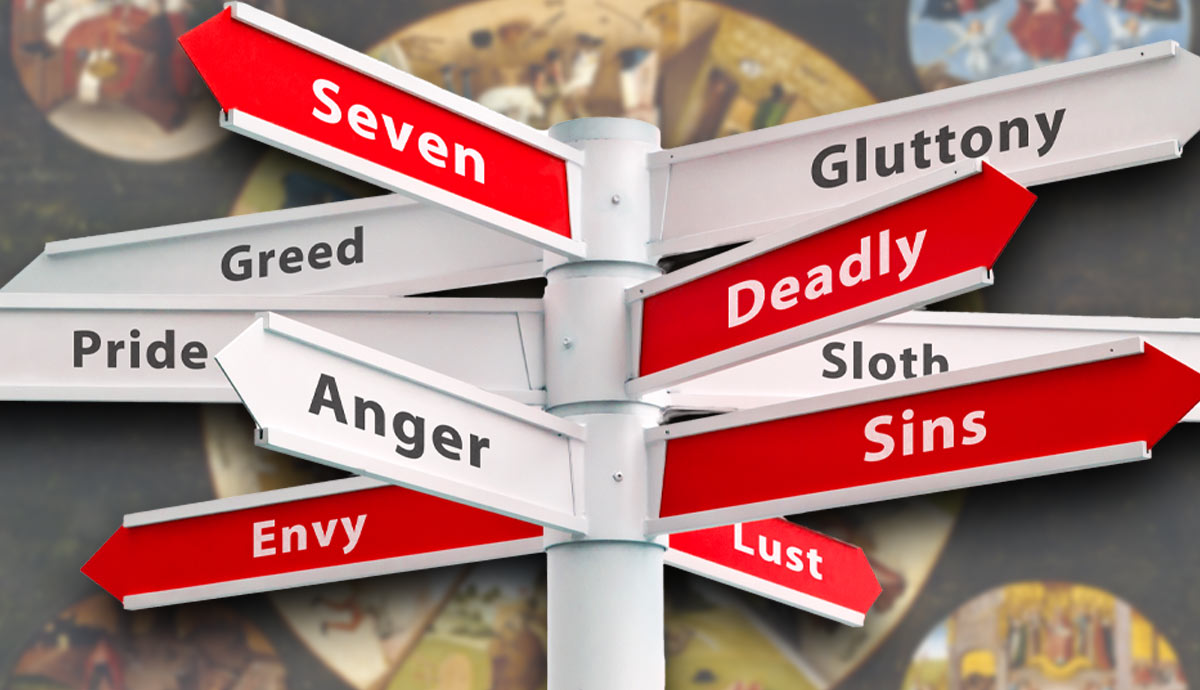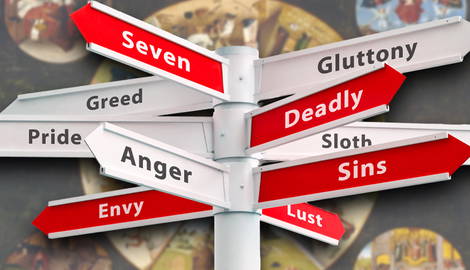
The seven deadly sins are pride, envy, wrath, sloth, greed, gluttony, and lust. During early Christianity, some Church Fathers identified them as deadly because they damage the believer’s relationship with God and usually lead to other sins. The idea of seven deadly sins has its origins with a Desert Father who identified eight logismoi (deadly thoughts) that posed challenges to those who desired to live holy lives. These logismoi had to be overcome by discipline and faith. They prevent people from realizing the characteristics associated with Godliness.
Origins and Development of the Seven Deadly Sins

Evagrius Ponticus, a Desert Father from the 4th century, was a monk and theologian who chose to live a monastic lifestyle dedicated to God. During his reflections on scripture, he identified eight sins that he considered particularly egregious. He called these “evil thoughts” logismoi, recognizing that sin has its origin in the mind, and by extension the attitude, of the individual. Evagrius’s list included sadness (Λύπη), which refers to a heavy, sorrowful state of mind. He understood it as a sadness arising from unmet desires or worldly attachments, which can lead to despair and hinder spiritual growth.
Pope Gregory I served as pope from 590 to 604 CE, after he set aside a life of privilege to dedicate his life to service to God. Like Evagrius, he embraced monastic living for a time and established several monasteries. Gregory refined Evagrius’s list into the seven sins we recognize today, combining some and adjusting their focus. Gregory made the concept of the seven sins more easily accessible to teach laypeople about moral living and ethical behavior.
Almost a millennium later, Dante Alighieri, the 14th-century poet, authored the Divine Comedy in which he popularized the sins as steps in the spiritual journey. In the first part, Inferno, which represents hell, Dante portrays the seven sins in their extreme form with the sinners unrepentant of them. The second part of the Divine Comedy has the title Purgatorio. In purgatory, a place where believers go through a cleansing process before entering heaven, the seven sins represent the stages of cleansing which Dante refers to as terraces the souls move through to attain a purer manifestation of love. Dante arranges the seven sins into three categories of love: perverted love (pride, envy, wrath), deficient love (sloth), and excessive love for earthly goods (avarice, gluttony, lust).
The Seven Deadly Sins

The seven deadly sins are not listed anywhere in scripture. There are, however, many verses in the Bible that highlight the danger of each of these sins. To better understand the seven deadly sins, we will consider each in turn.
Pride
The Greek word for pride is hyperephania (Ὑπερηφανία) and is a contraction of hyper (above or beyond) and phainomai (to appear). Pride is excessive self-esteem or arrogance that exalts self above God and others. Pride manifests in arrogance or excessive ego, where one views oneself as superior to others or the divine, which undermines humility and divine dependence.
The Bible presents it as the original sin of Satan in Ezekiel 28:12-19 (where the king of Tyre serves as a metaphor for Satan) and Isaiah 14:12-14.
Proverbs 16:18: “Pride goes before destruction, and a haughty spirit before a fall.”

Envy
The Greek word for envy is phthonos (φθόνος) and refers to resentment toward others’ possessions, qualities, or status. As such, it often leads to other sins such as hatred or malice. Like pride, the Bible attributes envy to Satan as well, because he desired to be “like the most High” (Isaiah 14:14). That same envy is what the serpent exploited when he told Eve: “Your eyes will be opened, and you will be like God” (Genesis 3:5).
Proverbs 14:30: “A heart at peace gives life to the body, but envy rots the bones.”
Wrath (Anger)
The Greek term for wrath or anger is orgē (Ὀργή). The root of the word aptly means to swell or grow hot. It refers to an intense emotional response characterized by hatred or vengeance. It often results in destructive actions such as physical violence or verbal abuse. We associate wrath with destructive and uncontrolled reactions to perceived offenses which disrupt inner peace, foster resentment, and damage relationships.
James 1:20: “For the anger of man does not produce the righteousness of God.”
Sloth or Acedia
The Greek term akēdía (Ἀκηδία) is a compound of a– which indicates the negative or an absence of, and kēdos which means care or concern. Therefore, acedia means “without care” or “lacking concern.” It denotes laziness, failure, or indifference in attending to moral and spiritual responsibilities. It results in spiritual lethargy, apathy, and despondency.

Acedia or sloth, in this sense, manifests in a neglect of spiritual disciplines such as Bible study, prayer, and meditation, and may also include a lack of care about spiritual well-being. Physical sloth results in decay and decline. Likewise, acedia results in spiritual depravity and starvation.
Proverbs 19:15: “Laziness brings on deep sleep, and the shiftless go hungry.”
Greed or Avarice
The Greek word philargyria (Φιλαργυρία) is a compound of philos (affinity or love) and argyros (silver or money). It quite literally describes the love of money, or greed. Within the context of sin, it specifically refers to an excessive desire for wealth and material possessions to the extent that it distracts from and detrimentally impacts spiritual pursuits. Greed is indicative of a worldly-minded attitude which undermines the ability to focus on and foster spiritual growth. Greed mostly comes at the expense of others.
1 Timothy 6:10: “For the love of money is a root of all kinds of evil.”
Gluttony
Gastrimargia (Γαστριμαργία) is a Greek word for overindulgence in food, drink, or other pleasures. It is a compound of gaster (stomach) and margia (madness) and describes an obsession with satisfying the stomach. As such, it manifests as an excessive preoccupation with eating and drinking whatever the stomach desires. It prioritizes the physical over the spiritual and results in diminished self-discipline and the inability to develop spiritual disciplines.
Proverbs 23:20-21: “Do not join those who drink too much wine or gorge themselves on meat, for drunkards and gluttons become poor.”

Lust
The Greek word porneia (Πορνεία) derives from the root word pornē, which means prostitute, and is related to pernēmi, which means “to sell.” Within the context of the seven deadly sins, it describes the desire for or obsession with sexual pleasure outside the boundaries of God’s design. It manifests in fornication, unchastity, or sexual depravity, all of which disconnects human sexuality from its initial sacred and spiritual purpose.
Matthew 5:28: “But I tell you that anyone who looks at a woman lustfully has already committed adultery with her in his heart.”
Theological Significance of the Seven Deadly Sins

The seven deadly sins are capital vices or root sins, giving rise to numerous other sins and moral failings. They distort the human soul’s orientation toward God and others, seeking to satisfy and prioritize self over others and the divine. They corrupt virtues at their core, disrupt relationships, foster a cycle of sin, and reflect a rebellion against God like that of Satan.
The egotistical nature of the seven deadly sins undermines spirituality and impedes the cultivation of a lifestyle of spiritual growth rooted in dedication and commitment to God. As such, they have wide-ranging consequences that affect much more than just the individual that practices these sins. Greed, for instance, fuels systemic injustice, while sloth can lead to neglect of social responsibilities.

Though they are deadly sins, none of them constitute the unpardonable sin mentioned in Matthew 12:31-32, Mark 3:28-30, and Luke 12:10. Saints throughout the Christian era have identified these sins as destructive to the pursuit of holiness and overcame them by developing self-discipline and self-control. In some instances, saints like the Desert Fathers embraced a lifestyle that was characterized by spiritual disciplines that are the counter opposite of the seven deadly sins. They would, for instance, practice fasting, service to others, give away their earthly possessions, and practice celibacy among other disciplines.
The seven deadly sins, far from being a relic of early Christianity, are as relevant today as they have ever been. Considering contemporary society, most of the seven deadly sins seem to have become commonplace. Rather than something to be avoided, they are used to entertain, promote, market, and entice. The sins of pride, envy, wrath, sloth, greed, gluttony, and lust have become so common that many, instead of considering them as deadly sins, accept them as part of life.










